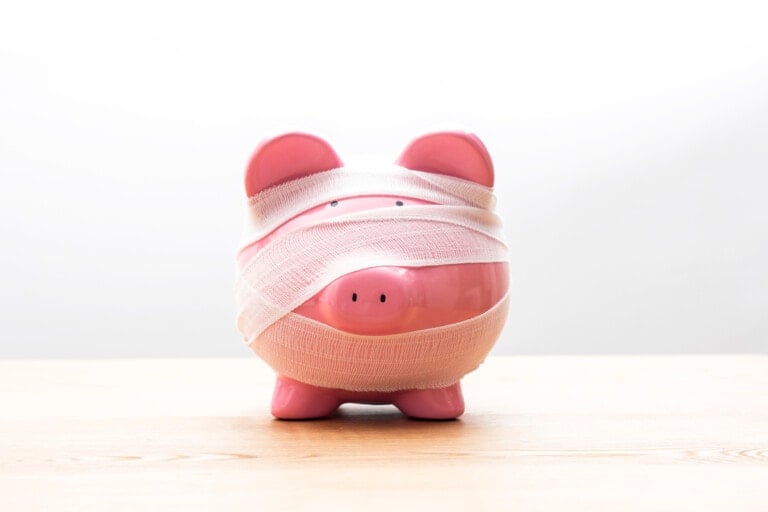You see the positive blue lines on the pregnancy test, and your head starts spinning. There is so much to do before your newborn arrives. You begin to feel like you won’t have enough time. There are many doctor appointments, and you must get the nursery ready. You have to start finishing up any projects at work and have an urge to get your money in order. Whether you’re expecting your first child, your second child, or even your fifth, there is always so much that needs to be done in just those short nine months. The stress of financial planning for a baby can take a front seat to all your worries. One question expectant parents face is whether to build their savings or pay down debt before the baby.
Pay Down Debt or Build Savings for Baby Financial Planning?
The best advice is to do both. But let’s be honest; building savings while paying down debt can be pretty impossible.
Build a Savings Cushion To Start Financial Planning for Baby
To start, it’s recommended for families to start an emergency fund with at least $1,000.1 Having savings can be a big relief during a financial setback. That cash reserve can be there if something breaks without warning, such as a car, or if your fridge goes out in the middle of summer. After you have the $1,000 saved, it’s time to build a bit more of a cushion, especially if you are pregnant or planning to become pregnant. For that, experts recommend building a fund of three to six months cash.2
When you are financially planning for a baby, you not only need an emergency fund, but you also need to build savings for your insurance deductibles. Already having the amount of your insurance deductibles in the bank will make the day those hospital bills arrive a lot easier. When your sweet baby is around 4 weeks old, you will start receiving bills from the hospitals and doctors. One look at those bills could be enough to send you into panic mode.
The Average Cost of a Complication-free U.S. Hospital Birth is $14,000
That $14,000 doesn’t even include if your little one needs to spend time in the neonatal intensive care unit.3 The average NICU costs nearly $3,000 daily in the United States, depending on the reason.4 Luckily, insurance will help cover most of the cost. However, you will still be liable for the deductible or out-of-pocket maximum. Most states put the birth of a baby under the mother, but if your baby has other medical needs and goes to the NICU, they’re listed as their own patient. At that point, not only do you have the mother’s deductible, but now you also have the child’s deductible. Insurance deductibles can be anywhere from $500 to $1,000 per person. So, a great tip when you’re expecting is to have two times your deductible in a savings account — one for you and one for the baby.
Once you have your emergency fund and deductible amounts saved, you take care of last-minute items. You may need to buy a few bigger items for your baby, like a crib, changing table, or car seat. Once your savings are built, it’s time to finish getting any last pieces you may not have received at the baby shower. After you have everything for your little one purchased and ready to go, you can switch your focus to paying down debt.
Start With Credit Cards or Store Cards To Pay Down Debt
These typically have a higher interest rate than bank loans, car loans, or mortgages. When you are ready to start paying down your debt, you must pick which method you want to follow. The first way is to pick the card with the lowest balance and work up from there. You start with paying off the smallest debt first while paying the minimum payment to all your other bills. Once you tackle your smallest balance, apply that amount to the next lowest debt amount. This is called the debt snowball, which is great because you build up momentum when paying off the smaller debts and keep it going all the way through.
Another way to pay down debt is to pick the card with the highest interest rate. By picking the card with the highest interest rate and paying it down first, you will save more money. For instance, let’s say your credit card charges a 20% interest rate annually, and it has a $3,000 balance with a $60 minimum monthly payment. If you pay just the minimum payment without any extra, then within a year, you could be paying over $400 in interest. This method works well if you have one or two debts with significantly larger interest rates than your other debts.
Once you have your emergency fund and the amounts of your insurance deductibles saved, you will breathe a huge sigh of relief. Then, you can spend the remaining time of your pregnancy preparing the nursery while making a dent in your debt. It may seem scary, but getting on top of your finances during pregnancy will ease your mind and help you enjoy your sweet newborn!































